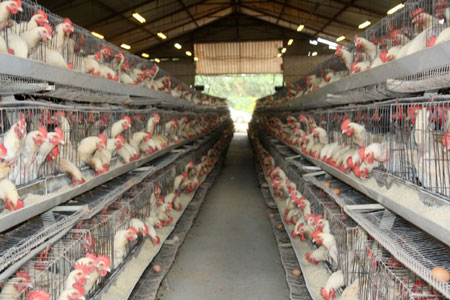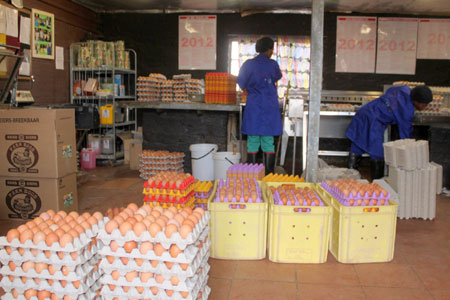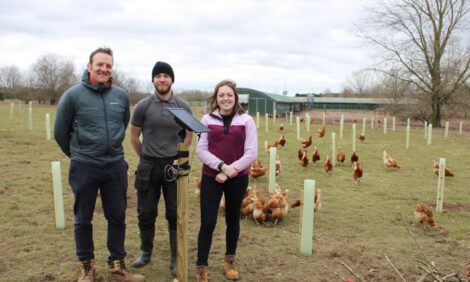



Hens with Benefits
SOUTH AFRICA - When there’s a booming market for poultry products, it makes sense for dairy farms to get in on the action. Chris McCullough reports on one South African milking operation that has found managing a poultry flock on the side comes with all sorts of desirable perks.Operating a mixed farm in South Africa certainly has its benefits, and when poultry is one of the enterprises then the rewards can be bountiful. There’s no doubt South Africa can be a tough place to live and farm but there are many opportunities within the country that can make farming a pleasure.


Many experts have claimed South Africa could be the breadbasket of the entire African continent, if agriculture is managed correctly. The Khourie family operate a mixed farm at Magaliesburg, just outside Pretoria, with dairying the predominant enterprise.
The family’s Bosparadys Farm was started by William Khourie and is now run by his sons Joe, Anthony and Pieter, who all take charge of the various enterprises. Dairying accounts for 80 per cent of the total farm income but the Khouries also farm with sheep, pigs, goats, game and hens. The family have farmed on this site for over 20 years and have built up a profitable business with an annual turnover of just under R 200 million (£11.9 million).
The family owns a total of 2,000 hectares at Bosparadys and a further 500 hectares are rented from a local landowner. Around 400 hectares are planted out in grasses and 1,100 hectares are used to produce maize silage averaging 14 tonnes per hectare. The remainder is natural land used for game farming.
Anthony Khourie is in charge of feed planning and production, and runs a stable feed bank that provides the fodder flow for continuous dairy production. Joe manages the dairy herd and the heifer herd while Pieter is the marketing manager for the farm.
Dairy operations are productive at Bosparadys. The farm milks 800 cows with an average yield of 30 litres per cow per day – but they have a high-yielding batch of 250 cows producing 40 litres per day. The high yielders are milked three times a day in the 14/28 herringbone milking parlour while the rest are milked twice per day.
The family process their own milk, manufacturing yoghurts, cheese and flavoured milk drinks, delivering them to around 200 retail outlets within a 150-mile radius of the farm on a daily basis.
But backing up the dairy enterprise on the farm is a flock of 20,000 laying hens which are used to produce eggs that are sold in the same retail outlets as the dairy products. When it comes to poultry, Anthony and his family use the Hy-line Red and White breeds as they receive a good income from those breeds when they are sold after their laying term finishes, usually after one year.
“Customers prefer the Hy-Line breed as it provides a tastier meat when slaughtered,” says Anthony. “We have tried different breeds over the years but these ones work well for us, hence why we stick with them.”
The birds are purchased at 20 weeks of age as laying pullets and reach their laying peak at 30 weeks with a 95 per cent laying rate. The Khouries have found it most profitable period for keeping the birds is up to around the year-old mark while they maintain an average 85 per cent laying rate.
Eggs are collected twice per day from the cages and are marketed according to their size, with the large ones measuring 30mm to 40mm and fetching a price of R 15 (£0.89) for one dozen. The retail outlets will add on their margin and sell the eggs for R 24 (£1.43).
“The hens provide work for some of our farm worker’s wives who lift the eggs and grade them,” says Anthony. “It is an important part of our business and generates a good income for the family. We also find the manure very useful in the paddocks for growing grass.”
“We do not have any problems with bird flu but we do vaccinate our hens against the normal diseases and take the usual bisosecurity measures to protect the flock,” he adds.
When the hens arrive on the farm they are fed phase-one starter feed with 16 per cent protein content. Later, in phase two, they are fed a lower-percentage protein feed which is cheaper to buy. All the feed is purchased but if the farm has any surplus maize from the dairy business they mix it with a high-protein supplement and feed it to the birds.
The manure produced by the birds, meanwhile, is used to fertilise the grassland pastures with additional assistance from some 28 per cent-nitrogen bag fertiliser that is bought in.
Poultry meat is becoming more popular in South Africa as regular economic growth within the country means more people can afford to eat meat. Around 2.9 million tonnes of poultry, beef and pork meat are consumed in the country each year, and 60 per cent of this total is poultry meat. Broiler products account for most of the poultry meat consumed in South Africa, which has risen dramatically, from 21.5kg per person per year in 2000 to 38.5kg per person per year in 2014.
So the future for the country’s poultry industry is looking very positive. In fact, poultry meat consumption is expected to increase by 38 per cent by 2024, according to South Africa’s Bureau for Food and Agricultural Policy (BFAP). This equates to about 700,000 tonnes of additional poultry consumption, which would surpass 44kg per capita.
However, imports will also play a vital role in supplying the demand for meat, as the country only produces about 2.4 million tonnes of poultry, beef and pork domestically. Favoured trading partners for meat purchase include Brazil, the Netherlands, the United Kingdom and Germany. Of late, South Africa has accused a number of EU countries of dumping cheap poultry exports on its doorstep, causing prices in the South African market to collapse.
In 2014 South Africa imported 392,820 tonnes of poultry meat, at a value of US $375 million, which represents about two per cent of world trade in poultry meat and four per cent in quantity. It’s an indication of just how healthy South Africa’s appetite for poultry is, which suggests that managing chickens as part of a mixed operation – especially if surplus and waste are put to profitable use, as at Bosparadys – is the smart approach to farming.









